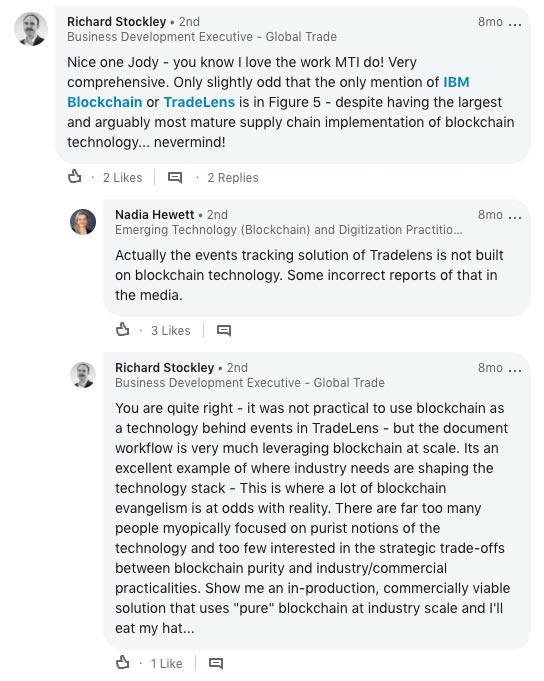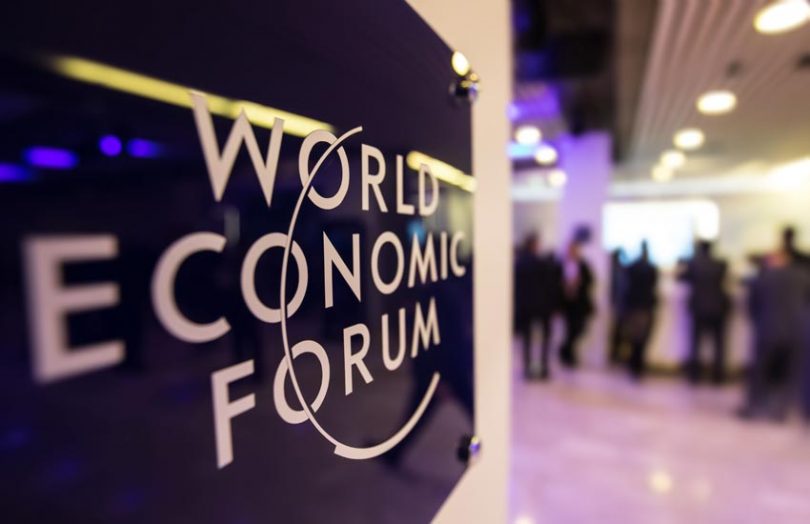Today the World Economic Forum (WEF) published an extensive document about deploying blockchains. The paper entitled “Redesigning Trust: Blockchain Deployment Toolkit” covers everything from building an ecosystem and consortium through to interoperability, identity and cybersecurity. This one of numerous papers published by the WEF and incorporates several of them.
Given the disruption to supply chains as a result of COVID-19, many have observed that if blockchain had already been more widely deployed, it would have helped to provide more transparency. And digitization would have meant less disruption in the trade finance sector because paperwork tends to be in-office. Hence the WEF toolkit is timely.
“The blockchain deployment toolkit is essential for designing solutions that work for a multitude of actors, including smaller players who may not have access to the resources required to unlock the value of blockchain technology,” said Nadia Hewett, Blockchain and Digital Currency Project Lead, World Economic Forum USA.
“For this reason, the toolkit can level the playing field for small and medium-sized enterprises. There are many lessons to learn from the current pandemic and this toolkit is a starting point for improving long-term pandemic preparedness and accelerating an economic recovery led by public-private cooperation.”
No IBM?
The WEF consulted extensively with more than 100 organizations, including SMEs and academics. The majority of the contributions came from the WEF, consultant Deloitte which co-authored previous papers, and law firm Latham & Watkins.
Apart from the core contributors, the document was widely reviewed by roughly 60 people.
But three of the reviewers were from enterprise blockchain firm R3, including two involved in sales and marketing.
Furthermore, there were no reviewers from Hyperledger, despite the unit leader Sheila Warren being a keynote speaker at the March Hyperledger Global Forum (see update below, Hyperledger was consulted).
The absence of IBM in the list of reviewers was surprising. Especially given it’s one of the most experienced organizations in this space. If they had chosen not to include any consultants to avoid bias, that could have made sense.
In fairness, the document does mention IBM projects, including TradeLens. And TradeLens co-developer Maersk accounted for two reviewers. Hyperledger Fabric also gets a fair share of mentions.
This is a step in the right direction as previous WEF reports barely mentioned TradeLens, apparently intentionally. Some time ago, an IBM executive highlighted the issue on LinkedIn when another WEF report was published last year. Whether or not you are a fan of IBM, they operate two of the most significant blockchain supply chain consortia in TradeLens and IBM Food Trust.

Clearly, IBM is no minnow and hardly needs defending. On the contrary, some have claimed it’s a bit pushy on the sales side. That’s not the point. If the document claims to represent a broad range of experience and best practice, even if you don’t agree or include IBM’s input, they should be asked because they might have something to add.
Another area where the balance is a little off relates to China, which is so very active in this area. It’s not completely omitted from the report, but it’s not fully represented, given the level of activity. We know there are ongoing tensions between the U.S. and China, and communication isn’t always easy, but the WEF is global and meant to build bridges.
Usually, we would not make a big deal about these sorts of issues and we know how hard it is to get the balance right. But the WEF isn’t just any organization. The bar is set far higher. Especially since inclusion is a key topic for the WEF. This, combined with the fact that blockchain is all about collaboration, means it matters.
In the spirit of fairness, we’ve contacted the WEF and IBM to get their perspective because we may be out of line.
Update: The WEF responded to say they consulted with the Linux Foundation, the parent of Hyperledger. It was part of a Project Community list that was not included in the pdf.
The statement also said: “The toolkit is a combined effort based on research, workshops, interviews and user feedback which took place all over the world, including a series of roundtables and interviews – we couldn’t list them all.”







